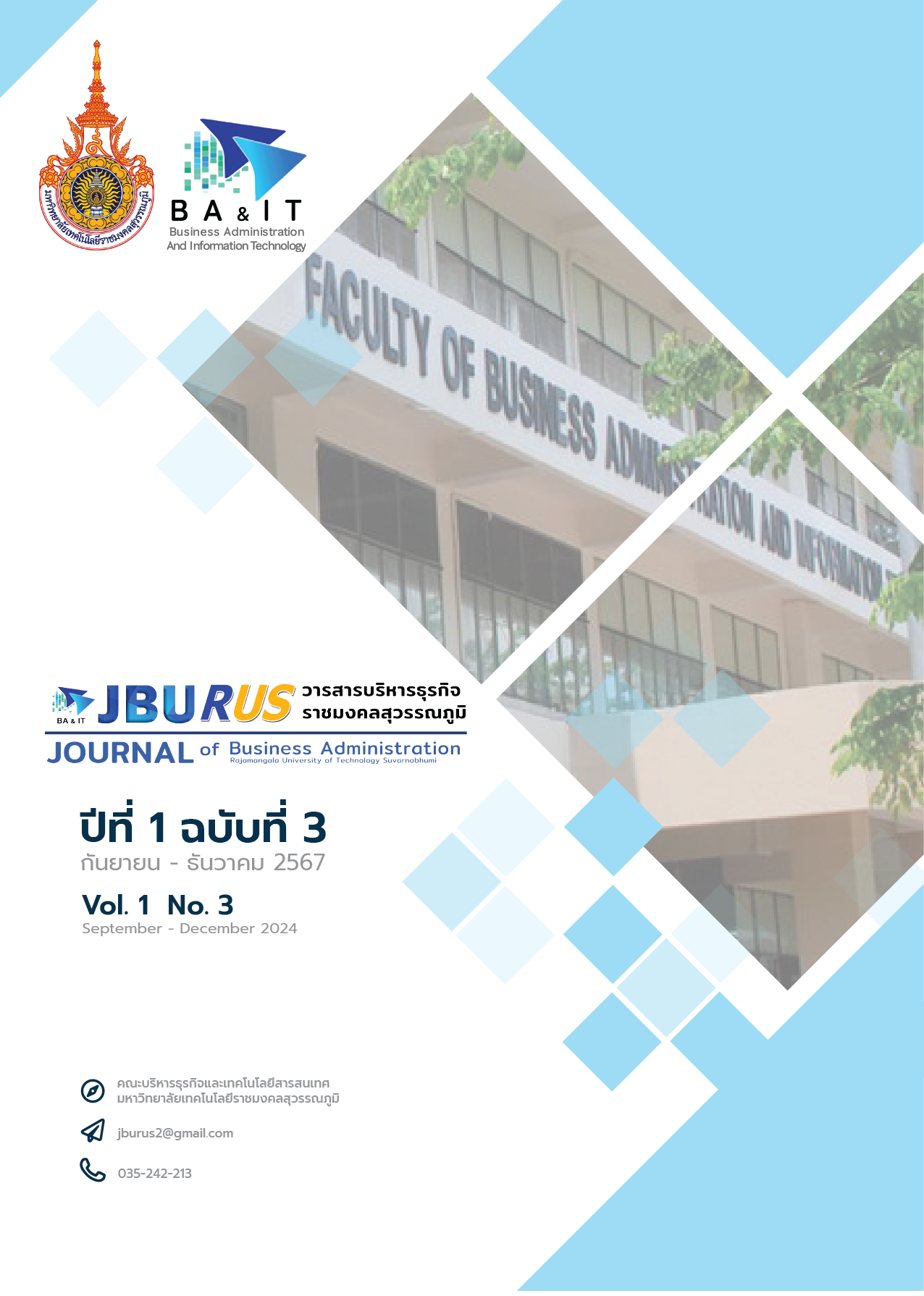A Study on the Conceptual Framework of Consumer Behavior towards Choosing to Use the 7-Eleven Mobile Application to Pay Products Instead of Cash
Keywords:
The payment of goods instead of using cash, Consumer behavior, 7-Eleven applicationsAbstract
This study aims to explore the conceptual framework of consumer behavior regarding the adoption of the 7-Eleven mobile application for product payment instead of cash. Consumers often prioritize convenience and security when using this application. Social media and the economic situation play significant roles in encouraging consumers to adopt the app. The findings indicate that consumers are generally satisfied with using the 7-Eleven app for transactions due to its convenience and security. Additionally, social and promotional factors contribute to the widespread use of the 7-Eleven mobile application. This academic article provides valuable insights for businesses in creating awareness of the benefits for consumers, focusing on aspects such as convenience, added benefits, and ease of use. These include application design, operational simplicity, and usability comprehension, to effectively meet customer needs. The development of products and services in the digital era and the internet of today's shopping and services.
References
ครูเชียงราย. (2555). ความหมายของกรอบแนวคิดในการวิจัยและวิธีการเขียนเพื่อให้ได้ผลลัพธ์ที่ดีที่สุด สืบค้นจาก https://www.kruchiangrai.net/2022/02/27/กรอบแนวคิดการวิจัย/
จุฑามาศ สอนชัย. (2566). การศึกษากรอบแนวคิดปัจจัยที่มีอิทธิพลต่อการตัดสินใจใช้บริการเดลิเวอรี่
ผ่านแอป พลิเคชันเซเว่นอีเลฟเว่น. ใน รายงานการประชุม การประชุมวิชาการระดับชาติราชมงคลสุรินทร์ครั้งที่ 14 (น. 1-11). สุรินทร์: มหาวิทยาลัยเทคโนโลยีราชมงคลอีสานวิทยาเขตสุรินทร์.
ชนิลทร ชูรัตน์. (2561). พฤติกรรมและความพึงพอใจในการใช้ชีวิตแบบสังคมไร้เงินสดของพนักงานบริษัท
ในอำเภอหาดใหญ่ จังหวัดสงขลา (ค้นค้าอิสระคณะบริหารธุรกิจ) สาขาวิทยบริการเฉลิมพระเกียรติจังหวัดสงขลา: มหาวิทยาลัยรามคำแหง.
ติณณมินทร์ สุขสมัย และ เกียรติศักดิ์ สมัครสมาน. (2562). การยอมรับเทคโนโลยีแอปพลิเคชันสั่งและส่ง อาหารของลูกค้าในกรุงเทพมหานครและปริมณฑล. วารสารวิชาการการจัดการ ภาครัฐและเอกชน, 1(2), 1-10.
นงลักษณ์ วิรัชชัย. (2543). พรหมแดนความรู้ด้านการวิจัยและสถิติ. รวมบทความทางวิชาการของ ดร.นงลักษณ์วิรัชชัย. (หน่วยที่ 4, น.162). ชลบุรี : วิทยาลัยการบริหารรัฐกิจ มหาวิทยาลัยบูรพา.
บุษยมาส ชื่นเย็น. (2567). พฤติกรรมผู้บริโภคและปัจจัยด้านการตลาดที่มีอิทธิพลต่อการตัดสินใจซื้อผลิตภัณฑ์ที่เป็นมิตรต่อสิ่งแวดล้อมของกลุ่มเจเนอเรชั่นวายในเขตภาคตะวันออกเฉียงเหนือตอนล่างของประเทศไทย. วารสารศิลปะการจัดการ, 8(1), 1-20
ปาริชาต สถาปิตานนท์. (2546). ระเบียบวิธีวิจัยการสื่อสาร (พิมพ์ครั้งที่ 2). กรุงเทพฯ : สำนักพิมพ์จุฬาลงกรณ์มหาวิทยาลัย.
พิชิต ฤทธิ์จรูญ. (2544). ระเบียบวิธีการวิจัยทางสังคมศาสตร์ (พิมพ์ครั้งที่ 1). กรุงเทพฯ : คณะครุศาสตร์ สถาบันราชภัฏพระนคร.
ยุวดี ฦาชา และคณะ. (2532). วิจัยทางการพยาบาล. กรุงเทพฯ: วิคตอรี เพาเวอร์พ้อยจำกัด.
สมหวัง พิธิยานุวัฒน์. (2535). การกำหนดตัวแปรในการวิจัย ในรวมบทความทางวิธีวิทยาการวิจัย (พิมพ์ครั้งที่ 2). กรุงเทพฯ : สำนักพิมพ์จุฬาลงกรณ์มหาวิทยาลัย.
สิงหะ ฉวีสุข และ สุนันทา วงศ์จตุรภัทร. (2555). ทฤษฎีการยอมรับการใช้เทคโนโลยีสารสนเทศ. วารสารเทคโนโลยีสารสนเทศลาดกระบัง, 1(1), 1-21.
สิทธิชัย ภูษาแก้ว. (2560). ปัจจัยการยอมรับเทคโนโลยีที่มีผลต่อการตัดสินใจใช้บริการ Grab ของผู้บริโภคในกรุงเทพมหานคร (วิทยานิพนธ์บริหารธุรกิจมหาบัณฑิต, มหาวิทยาลัยกรุงเทพ, ปทุมธานี). สืบค้นจาก http://dspace.bu.ac.th/bitstream/123456789/3353/1/sitthichai_phus.pdf
สิรินทิพย์ เดชก้องไกล, (2560). ปัจจัยที่ส่งผลต่อการตัดสินใจเกี่ยวกับการใช้บริการระบบพร้อมเพย์ของธนาคารกสิกรไทยในเขต กรุงเทพและปริมณฑล (วิทยานิพนธ์บริหารธุรกิจบัณฑิต,มหาวิทยาลัยธรรมศาสตร์, ปทุมธานี). สืบค้นจาก http://ethesisarchive.library.tu.ac.th/thesis/2017/TU_2017_5902030468_7964_6704.pdf
สุวรรณา ธุรโชติ, (2541). วิธีวิจัยทางสหกรณ์ (พิมพ์ครั้งที่ 4). กรุงเทพฯ : มหาวิทยาลัยเกษตรศาตร์.
Bank of Thailand. (2021). Thailand payment system report 2021. Bangkok, Thailand: Bank of Thailand.
Bano, M., & Zowghi, D. (2015). A systematic review on the relationship between user involvement and system success. Information and Software Technology, 58, 148–169. https://doi.org/10.1016/j.infsof.2014.06.011
Chauhan, S., Jaiswal, M., & Singh, S. (2020). Understanding the adoption of mobile wallets in India: Extending the TAM model. Journal of Indian Business Research, 12(3), 20–35.
Chen, Y., Lu, X., & Luo, L. (2019). Mobile payment adoption: Empirical evidence from emerging market consumers. Computers in Human Behavior, 95, 13–22. https://doi.org/10.1016/j.chb.2018.12.028
Choi, H., & Lee, H. (2019). Factors affecting user satisfaction and usage intention in mobile shopping applications. Journal of Retailing and Consumer Services, 49, 9–18. https://doi.org/10.1016/j.jretconser.2019.03.012
Davis, F, Bagozza, R. P, & Warshaw, P. R. (1989). User acceptance of computer technology: A comparison of two theoretical models. Management Science, 35(8), 982-1003.
Davis, F. D. (1989). Perceived usefulness, perceived ease of use, and user acceptance of information technology. MIS Quarterly, 13(3), 319–340. https://doi.org/10.2307/249008
Gefen, D., Karahanna, E., & Straub, D. W. (2003). Trust and TAM in online shopping: An integrated model. MIS Quarterly, 27(1), 51–90. https://doi.org/10.2307/30036519
Hennings. (2010). The influence of consumers’ risk attitudes and behavior on the adoptionof online banking services. Journal of marketing trends, 1, 7-10.
KPMG. (2022). Digital payments in Southeast Asia: Security and trust issues. Bangkok, Thailand: KPMG.
National Innovation Agency. (2022). Digital transformation in Thailand: Opportunities and challenges. Bangkok, Thailand: National Innovation Agency.
Oliver, R. L. (1980). A cognitive model of the antecedents and consequences of satisfaction decisions. Journal of Marketing Research, 17(4), 460–469.
PwC Thailand. (2021). Consumer behavior in the post-COVID-19 era. Bangkok, Thailand: PwC.
Venkatesh, V., & Davis, F. D. (2000). A theoretical extension of the technology acceptance model: Four longitudinal field studies. Management Science, 46(2), 186–204. https://doi.org/10.1287/mnsc.46.2.186.11926
Wiersma. (2000). Research Methods in Education: An Introduction. (6th ed). Massachusetts: Allyn & Bacon A Simmon and schuster Company.
Downloads
Published
How to Cite
Issue
Section
License
Copyright (c) 2024 คณะบริหารธุรกิจและเทคโนโลยีสารสนเทศ มหาวิทยาลัยเทคโนโลยีราชมงคลสุวรรณภูมิ

This work is licensed under a Creative Commons Attribution-NonCommercial-NoDerivatives 4.0 International License.






